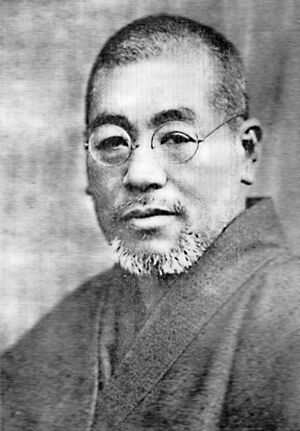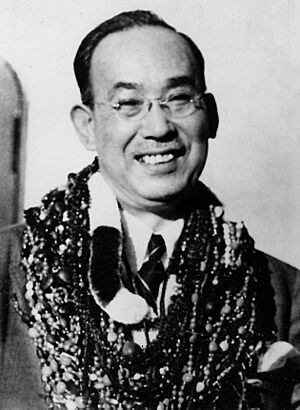Reiki facts for kids
Quick facts for kids Reiki |
|||||||||||||
|---|---|---|---|---|---|---|---|---|---|---|---|---|---|
| Chinese name | |||||||||||||
| Traditional Chinese | 靈氣 | ||||||||||||
| Simplified Chinese | 灵气 | ||||||||||||
|
|||||||||||||
| Vietnamese name | |||||||||||||
| Vietnamese alphabet | linh khí | ||||||||||||
| Korean name | |||||||||||||
| Hangul | 영기 | ||||||||||||
| Hanja | 靈氣 | ||||||||||||
|
|||||||||||||
| Japanese name | |||||||||||||
| Hiragana | れいき | ||||||||||||
| Kyūjitai | 靈氣 | ||||||||||||
| Shinjitai | 霊気 | ||||||||||||
|
|||||||||||||
Reiki (霊気, /ˈreɪki/) is a Japanese way of trying to heal people. It is a type of alternative medicine, which means it is not part of standard medical care.
People who practice Reiki are called practitioners. They use a method called palm healing or hands-on healing. They believe a "universal energy" can be passed from their hands to a person. This energy is thought to help with emotional or physical healing.
Scientists say Reiki is a pseudoscience. This means it looks like science but does not use scientific methods. It is based on the idea of qi (pronounced "chee"). Practitioners say qi is a "life force" that is everywhere. However, there is no scientific proof that this life force exists.
Medical research has not shown that Reiki works as a treatment for any health problem. This includes conditions like cancer, anxiety, or depression. Because of this, Reiki should not replace regular medical treatment. Studies that reported positive effects often had problems with how they were done.
Contents
What Does Reiki Mean?

The word Reiki comes from Japanese. It means "mysterious atmosphere" or "miraculous sign." It combines two Japanese words:
- Rei means "soul" or "spirit."
- Ki means "vital energy" or "life energy."
This Japanese word is similar to the Chinese word língqì, which also means "numinous atmosphere."
How Reiki Started
Reiki was started by a Japanese man named Mikao Usui. He lived from 1865 to 1926. According to a stone memorial for him, Usui taught his Reiki system to more than 2,000 people. He died in 1926.
Later, one of Usui's students, Chujiro Hayashi, continued teaching Reiki. One of Hayashi's students, Hawayo Takata, brought Reiki to the United States. She opened the first Reiki clinic there in 1970.
Why Scientists Are Skeptical
The Idea Behind Reiki
Reiki teachers say that qi is a real part of the body. They believe it can be changed to treat sickness. But medical research has not found any proof that qi exists. This is why scientists call Reiki a pseudoscience. It is based on ideas that cannot be proven by science.
Most studies on Reiki are not well-designed. This means their results might not be accurate. There is no strong scientific proof that Reiki helps with any medical condition. Some doctors say it might help people feel generally better. However, this feeling might just be from the placebo effect. This is when a person feels better because they believe a treatment will work, not because the treatment itself does anything.
What Experts Say
Many experts use Reiki as an example of a pseudoscience. They say that Reiki claims there is a "universal energy" that science does not know about. This energy cannot be found or measured.
Experts also point out that the way Reiki is supposed to work has not been shown by science. They say that even though Reiki is popular, its basic idea has not been proven.
Some groups, like the American Academy of Neurology, have looked at Reiki. They say that Reiki should probably not be used for treating painful nerve problems in people with diabetes. A Canadian expert, Susan J. Palmer, has also listed Reiki as a pseudoscientific healing method.
Problems with Studies
A large review of studies on Reiki in 2008 found many problems. The results about how Reiki affected depression and anxiety were not reliable. Also, scientists have not been able to get the same results when they try to repeat studies that supported Reiki.
Many studies on Reiki did not clearly explain how they were done. They often did not say how many people were in the study. They also did not use proper methods to make sure the results were fair. These studies often made the treatment seem more effective than it was. They also did not control for differences between Reiki practitioners. No study reported any bad side effects.
Is Reiki Safe?
Reiki sessions are generally considered very safe. They are similar to many other complementary and alternative medicine practices. However, some doctors worry that people might choose Reiki instead of proven medical treatments. This could be dangerous for serious health problems.
Concerns from the Catholic Church
In 2009, the United States Conference of Catholic Bishops looked at Reiki. They said that practicing Reiki was based on superstition. They believed it was not true faith healing or science-based medicine. They also said Reiki was not right for Christian beliefs. This is because it focuses on a human power to heal, not on prayer to God.
Because of this, the Church said Catholic hospitals and other places should not promote or support Reiki. Some Catholic people still practice Reiki, but it has been removed from many Catholic hospitals.
Training and Cost
There is no main group that controls the words Reiki or Reiki master. You can even buy certificates online for a low price. It is common for someone to become a "Reiki master" in just two weekends. There are no rules for Reiki practitioners in the United States.
In 2014, The Washington Post reported that at least 60 hospitals in the United States offered Reiki. This was because customers asked for it. A session could cost between $40 and $300. In the UK, some cancer centers offer free or low-cost Reiki for people with cancer.
See also
 In Spanish: Reiki para niños
In Spanish: Reiki para niños
- Glossary of alternative medicine
- Laying on of hands
- List of ineffective cancer treatments
- Scientific skepticism
- Quackery
 | Jewel Prestage |
 | Ella Baker |
 | Fannie Lou Hamer |


